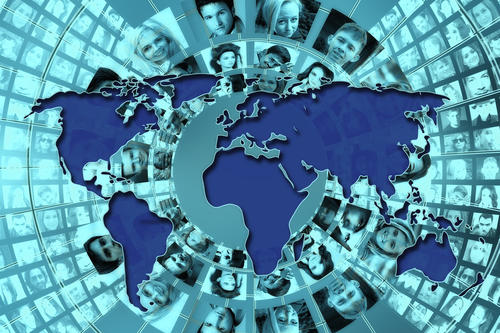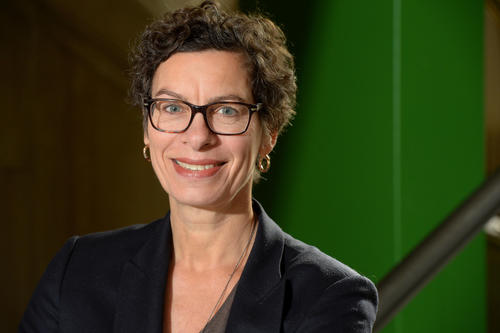Who Rules the Internet?
Jeanette Hofmann, a professor of Internet politics at the Institute for Media and Communication Studies at Freie Universität, explores governance on the Internet.
Jun 26, 2017
Big community: About 3.4 billion people around the world used the Internet in 2016, according to an estimate by UNESCO.
Image Credit: geralt / Pixabay/CC0 1.0
A political scientist, Jeanette Hofmann is a professor of Internet politics and an Internet pioneer. For nearly two decades, she has been doing research on the rules of the Internet.
Image Credit: David Ausserhofer
Free access to information, no censorship of opinions, and the possibility of communicating across national borders and working together to develop ideas to promote progress and prosperity – those were the reasons the World Wide Web was nominated for the Nobel Peace Prize in 2009. Eight years later, fake news, filter bubbles, abusive postings, and data misuse are the main subjects of conversation about “the Net.”
Jeanette Hofmann has spent just under two decades at the Berlin Social Science Center (WZB) studying what rules apply in this virtual space and who should set them. The interaction of society, the political sphere, and Internet technology is also the subject of a seminar led by Hofmann, an Internet pioneer, who has recently been appointed to a professorship at the Institute for Media and Communication Studies at Freie Universität.
Should Facebook be obligated to delete hateful postings and videos with violent content? Should governments be allowed to decide what content appears on the Net? Internet users, politicians, companies, and their lawyers all over the world are engaged in negotiating which rules should apply on the Net, and who will check to ensure that they are being implemented. “How the political sector deals with the accomplishments and issues of the Internet is largely unclear,” Hofmann says. Whether the Net is an overarching topic that cuts across all fields of public policy or is perceived as a policy field in its own right and set up accordingly is still unclear, she says, continuing, “That is due in part to the fundamentally decentralized, non-hierarchical structure of the Internet, which transcends national boundaries.”
Technical Feasibility Long Set the Rules for the Internet
When Hofmann started her scholarly research on the sociopolitical development of the Internet, back in the mid-1990s, relatively few households in Germany even had routers. At that time the rules for how the Net worked were primarily set by technical factors. “I first encountered the Internet as a very open medium, and one where there were very few rules in comparison to the phone network, which was set up by the state,” Hofmann says. As the number of Internet users rose over the years, the various interests in shaping the Net grew as well.
In 2003, the United Nations organized the first-ever World Summit on the Information Society, held in Geneva. Dozens of heads of state negotiated the possibility of Internet governance, but they came away nearly empty-handed. Not long afterward, Hofmann traveled to a second world summit, this one held in Tunis, with the German government delegation as a representative of civil society. This time around, the parties to the negotiations moved closer together. “One of the things decided on in Tunis was the establishment of the transnational Internet Governance Forum, which is supported jointly by governments, the business sector, and civil society. These kinds of ‘multi-stakeholder’ processes play an increasingly important role in international politics,” she explains.
Hofmann is now devoting her first seminar at the Institute for Media and Communication Studies at Freie Universität to the subject of “big data,” or massive collections of digital data. Collecting and processing user data, a contentious point in itself, is something that is desired in various areas. Take sports, for example, where smartwatches log every step and document training achievements. But big data is also used to hunt for terrorists, making it possible to profile their flight and escape routes. With this in mind, Hofmann plans to focus on the setting of rules for big data as one of the topics of her seminar.
Rules for Facebook and Other Companies
When it comes to data transfers, companies like Facebook and Google have wide latitude thanks to their terms and conditions, despite national and European rules and regulations. Hofmann sees that as a problem. She says, “A problematic business model has become established on the Internet. I think it is highly questionable for detailed information on the everyday lives of entire generations of people to be collected. In my opinion, this practice conflicts with our democratic principles, and it ultimately amounts to a totalitarian system. It certainly conflicts with the principle of self-determination.” After all, she explains, everyone in Germany has the right to decide for themselves regarding the disclosure and use of their personal data.
Hofmann explains that German Internet users are fundamentally aware that their data are being used as a kind of currency for things like the service of search engines, which is only ostensibly free, or for social media. For it to be possible to create alternatives to “data capitalism,” however, society would need to exert greater pressure on policymakers and companies, she says.
She does not demonize the Net as a whole, as some critics do – far from it. But what Hofmann aims to demonstrate to students in her seminar is that no one is simply at the mercy of the Internet and new technologies. “We ascribe great autonomy and influence to technology, but at the same time we expect society to always be flexible and willing to learn,” she explains. “That is overestimating technology. We shouldn’t forget that we have the ability to help shape the Internet.”
Further Information
Several members of the Institute for Media and Communication Studies are participating as representatives of Freie Universität in an application for a future entity known as the German Internet Institute, which will receive funding from the German Federal Ministry of Education and Research as part of a competitive process. Readers can visit the project website to learn about the application filed by the Berlin-Brandenburg regional association, which is being coordinated by the Berlin Social Science Center (WZB). In addition to the WZB, Berlin’s four universities – Freie Universität Berlin, Humboldt-Universität zu Berlin, Berlin University of the Arts, and Technische Universität Berlin – and the University of Potsdam and the Fraunhofer Institute for Open Communication Systems (FOCUS) are involved in the applicant consortium.
The institute’s aim is to study the effects and consequences of digitization in various areas of life and harness the findings for society at large. The BMBF’s decision as to which association receives the contract was announced on Tuesday, May 23, 2017. The German federal government plans to contribute as much as 50 million euros in support of the institute during its first five years.


